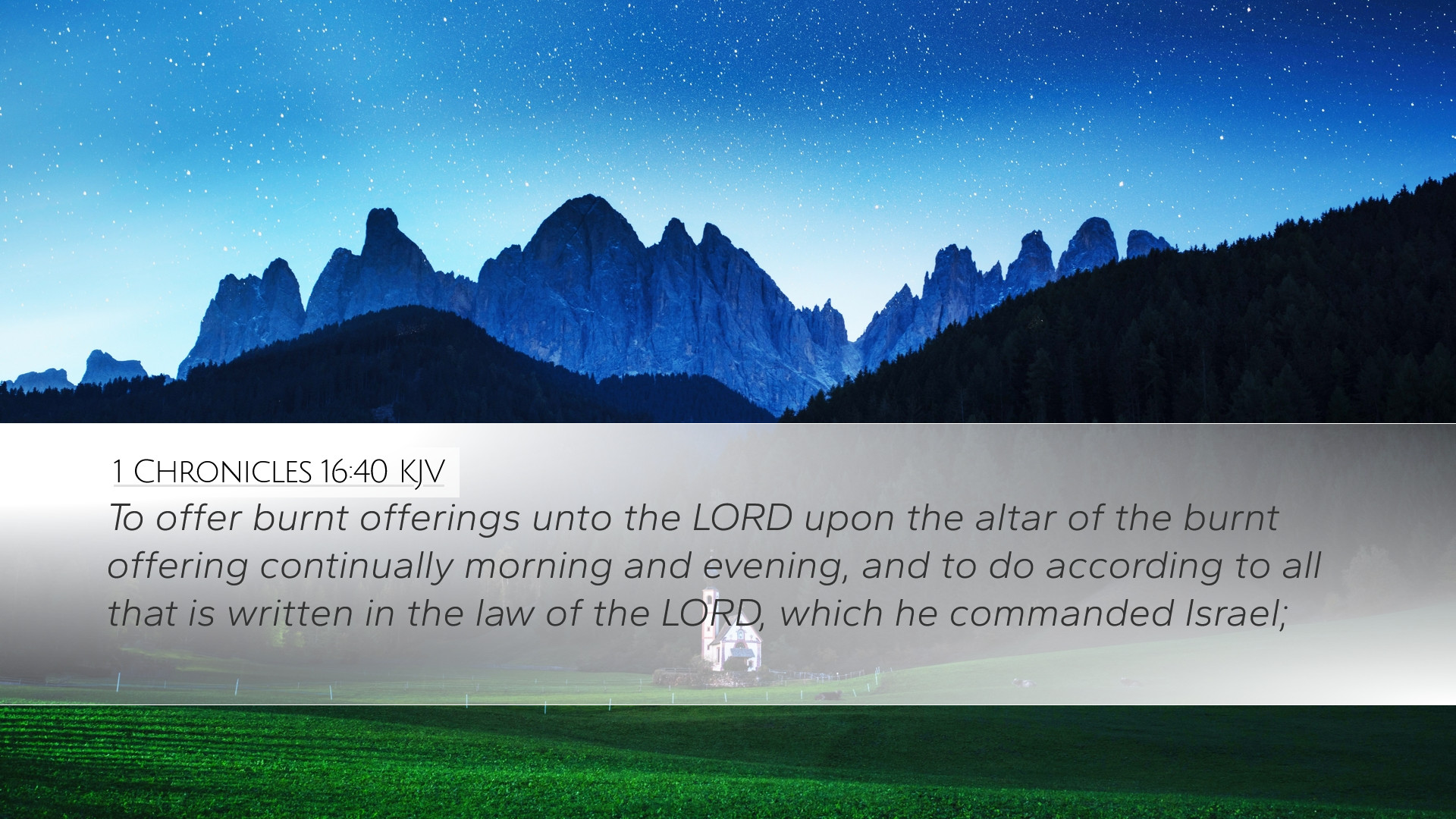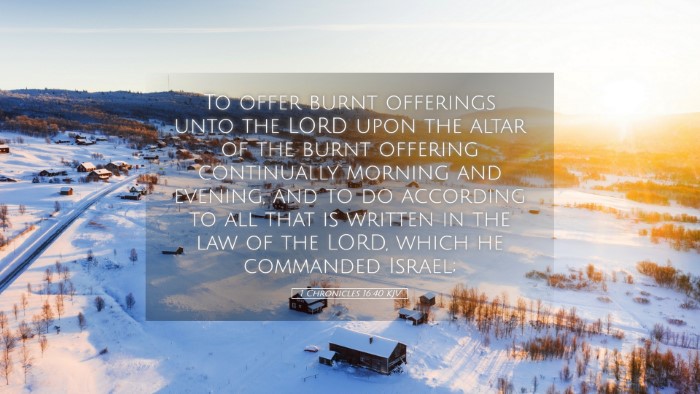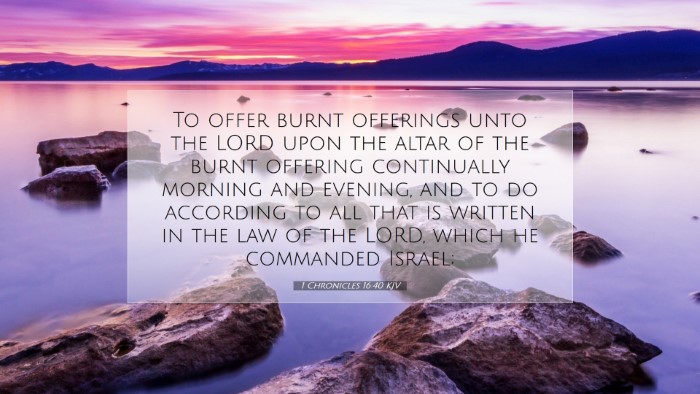Commentary on 1 Chronicles 16:40
Bible Verse: 1 Chronicles 16:40 - "To offer burnt offerings unto the LORD upon the altar of the burnt offering continually morning and evening, and to do according to all that is written in the law of the LORD which he commanded Israel."
Introduction
The passage of 1 Chronicles 16:40 encapsulates a significant moment in the history of Israel's worship practices during the time of King David. This verse not only highlights the importance of continual offerings but also establishes a framework for understanding the relationship between worship and adherence to God's commandments. Here, we will draw insights from various public domain commentaries to explore the theological, historical, and practical implications of this instruction.
The Context of 1 Chronicles 16
In 1 Chronicles 16, we find King David establishing worship in a new form following the return of the Ark of the Covenant to Jerusalem. This event is celebrated with songs, thanksgiving, and offerings, showcasing David's commitment to reinstating true worship among the Israelites.
Albert Barnes notes that this chapter serves as an essential account of David's efforts to centralize worship to one place, reflecting an intention to unify the nation under God. The importance of consistent burnt offerings signifies a call to both corporate and individual obedience to the Lord.
Interpretation of Burnt Offerings
The directive to offer burnt offerings continually underscores the necessity of maintaining a constant relationship with God. Burnt offerings were a significant aspect of Old Testament worship, symbolizing complete surrender to God.
- Matthew Henry: He emphasizes that burnt offerings represent the full devotion of the worshiper, indicating a life entirely given over to God’s service. This act of worship is intrinsic to maintaining one's moral and spiritual integrity.
- Adam Clarke: Clarke elaborates on the symbolic nature of the burnt offerings, noting that they are meant to signify atonement and the need for purification. This reflects the heart of worship as one of repentance and gratitude.
The Importance of Regularity in Worship
The phrase "continually morning and evening" reflects the necessity of regular worship as a fundamental principle in the life of the congregation. This routine was vital for Israel's spiritual health.
- Albert Barnes: He points out that the practice of morning and evening sacrifices provides a structure within which God's people could express their devotion and seek His favor. Such regularity is crucial for maintaining spiritual vigilance and dependence on the Lord.
- Matthew Henry: He notes that this perpetual worship not only honored God but also provided a continual reminder for the people to align their lives with God’s standards as outlined in the Mosaic Law.
Adherence to the Law
The call to "do according to all that is written in the law of the LORD" emphasizes the importance of the Scriptures in guiding worship and conduct. This connection between worship and obedience reflects the holistic nature of faith within the Israelite community.
- Adam Clarke: He articulates that the law serves as a foundation for the people's relationship with God, and adherence to it is both a privilege and responsibility. Obedience to God's word is essential to experience true community and the blessings of His covenant.
- Matthew Henry: Henry asserts that the law is not just a set of rules, but a means through which the people understand the character of God and how to live in accordance with that character. The law directs their burnt offerings and underpins their worship activities.
Theological Reflections
This verse serves as a bridge between the Old Testament sacrificial system and the New Testament understanding of worship. The realization that Christ ultimately fulfills the sacrificial role gives depth to our understanding of worship today.
- Albert Barnes: His commentary encourages readers to view these practices through the lens of Christ’s atonement, reinforcing that Jesus is the ultimate burnt offering who has made perfect atonement for sin.
- Matthew Henry: He contributes to this discussion by suggesting that while the burnt offerings were a temporary means of atonement, they pointed towards the necessity of a greater sacrifice, which we recognize in the New Testament narrative.
Practical Application for Today
The instructions in 1 Chronicles 16:40 are not merely historical but carry significant implications for the modern church. The principles of regular, heartfelt worship, coupled with a commitment to obey God’s word, remain vital.
- Encouragement for Pastors: David's emphasis on worship sets a biblical precedent for church leadership today. Leaders are called to prioritize and facilitate continuous worship that is grounded in scriptural truth.
- For Theologians and Students: The interplay between worship, the law, and God’s covenant offers rich material for theological exploration. Understanding the historical context of these worship practices enhances our comprehension of the continuity of biblical principles.
Conclusion
In 1 Chronicles 16:40, we find a multifaceted view of worship that encompasses obedience, sacrifice, and the importance of consistent practice. This verse instructs us to approach our relationship with God with the same seriousness and dedication that was prescribed to ancient Israel—acknowledging that worship is both a privilege and a responsibility. As we reflect on these insights, may we be inspired to cultivate lives marked by persistent devotion and fidelity to God’s word.


